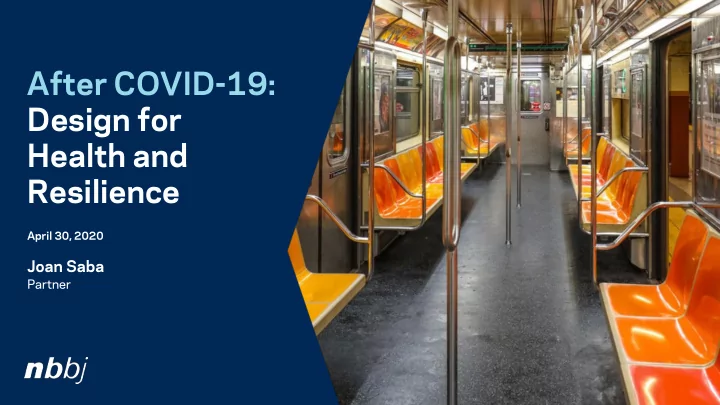

After COVID-19: Design for Health and Resilience April 30, 2020 Joan Saba Partner
— What’s Next In Academic Medical Centers — Synergy of Clinical Care, Research and Teaching — Power of Multidisciplinary Teams — Patient and Family Agency — Healing the Whole Body — Designing for Performance Massachusetts General Hospital, Lunder Building Boston, MA
designing spaces for experience Massachusetts General Hospital, Lunder Building Boston, MA
designing spaces for experience
designing spaces for experience
designing spaces for experience
designing and public health American University Medical Center in Beirut Beirut, Lebanon
a level playing field
segregation
designing spaces for experience
Project NOVA Southeast Louisiana Veterans Administration Medical Center New Orleans, LA
University Medical Center New Orleans, LA
sharing our humanity
designing spaces for gratitude
designing spaces to live comfortably with a pandemic
resiliency
resiliency
human resiliency
human resiliency
wellness resiliency
material resiliency NBBJ Plan for Prefabricated Augmentation of US Army Corps of Engineers A2HC Concept
mutual resiliency
mutual resiliency
Thank you
After er C COVID-19: ( (Re)Building R Resilient C Cities What do we need next from city leaders? Katharine Lusk Co-Director BU Initiative on Cities Boston University Initiative on Cities
First… a rea eality che heck. M Muni unicipal layoffs a s and nd ser ervice c e cut uts a s are e coming g https://www.usmayors.org/2020/04/14/the-economy-and-cities-what-americas-leaders-are-seeing/ N~2,400 US cities, villages and towns in early April, 2020
CONFRONT GRIEF TOGETHER
MAKE SPACE FOR PEOPLE
https://twitter.com/theurbangeog https://usa.streetsblog.org/2020/04/15/the-social-distancing-machine-proves-we-need-wider-sidewalks-now/
Milan, Italy – Streets for People
MAKE S KE SPACE F E FOR P PEOPLE • Create space for people. Widen sidewalks, create new dedicated bike lanes and bus lanes, increase transit frequency, devote more space to open air markets, continue select street closures – especially in neighborhoods at greatest risk. • Survey residents and health officials to understand both risk & anxiety – which residents feel vulnerable and where? E.g. Commuting, shopping • Recognize employers for formalizing work from home policies, staggering work hours, investing in bike parking, EV charging; Model these policies at City Hall. • Make home a healthy space – anticipate summer heat waves and cold snaps. Invest in energy assistance, home energy audits
CLEAR THE AIR
2019 2020 https://www.nature.com/articles/d41586-020-01049-6; AP
CLEAR T THE A AIR • Invest in green infrastructure - Put trees where they aren’t and protect what you have. • Keep decarbonizing – buildings, transit, municipal fleets • Make active transit and e-mobility options more widely accessible - not just EVS, but also e-bikes, scooters. Engage and educate diverse communities on routes, rules, resources • Live local – “10 minute neighborhoods”. Zoning that allows for mixed use, walkable/bikeable streets
COMMUNICATE AND INSPIRE CONFIDENCE
Katharine Lusk Co-Director Boston University Initiative on Cities @Kathlusk klusk@bu.edu Boston University Initiative on Cities
Recommend
More recommend